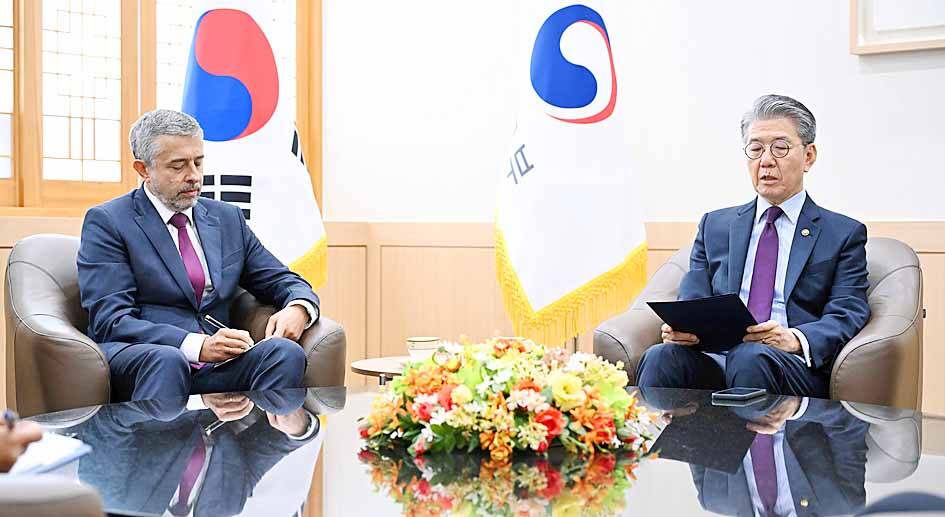South Korea yesterday demanded the immediate pullout of North Korean troops allegedly deployed in Russia as it summoned the Russian ambassador to protest deepening military cooperation between Pyongyang and Moscow.
South Korea’s spy agency on Friday last week said that it had confirmed that North Korea sent 1,500 special operation forces to Russia this month to support Moscow’s war against Ukraine.
Ukrainian President Volodymyr Zelenskiy earlier said his government had intelligence that 10,000 North Korean soldiers were being prepared to join invading Russian forces.

Photo: EPA-EFE
During a meeting with Russian Ambassador Georgy Zinoviev, South Korean Vice Minister of Foreign Affairs Kim Hong-kyun “condemned in the strongest terms” North Korea’s troop dispatch that he said poses “a grave security threat” to South Korea and the international community, the South Korean Ministry of Foreign Affairs said in a statement.
Kim said that South Korea in collaboration with the international community would mobilize all available means to deal with an act that threatens its vital national security interests, the statement said.
The Russian embassy quoted Zinoviev as saying that the cooperation between Russia and North Korean is not aimed against the security interests of South Korea.
In a telephone call with NATO Secretary-General Mark Rutte yesterday, South Korean President Yoon Suk-yeol said that Seoul would not sit idly by “reckless” military cooperation between Pyongyang and Moscow.
Yoon said South Korea would send a delegation to NATO to exchange information about Russian-North Korean cooperation, Yoon’s office said.
Rutte wrote on social media that North Korea possibly fighting alongside Russia would “mark a significant escalation.”
The US and NATO have not confirmed that North Korean troops were sent to Russia, but the reports of their presence have already stoked concerns in South Korea that Russia might provide North Korea with sophisticated technologies that can sharply enhance its nuclear and missile programs in return for its troop dispatch.
North Korea’s advancing nuclear arsenal is a major security threat to South Korea.
North Korean leader Kim Jong-un has taken steps to permanently terminate all relations with South Korea and has threatened to use nuclear weapons pre-emptively.
Some observers say South Korea would likely consider supplying weapons to Ukraine if Russian transfers of high-tech nuclear and missile technologies to North Korea are verified.
South Korea has joined US-led sanctions against Moscow over its invasion of Ukraine in February 2022, but it has not directly provided arms to Kyiv, citing its longstanding policy of not supplying weapons to nations actively engaged in conflicts.
Russia earlier denied using North Korean troops in its war with Ukraine. North Korea’s state media has not commented on the matter.
Ukrainian officials released a video allegedly showing North Korean troops lining up to collect Russian military clothes and bags at an unknown location. The Associated Press could not verify the footage independently.

AIR SUPPORT: The Ministry of National Defense thanked the US for the delivery, adding that it was an indicator of the White House’s commitment to the Taiwan Relations Act Deputy Minister of National Defense Po Horng-huei (柏鴻輝) and Representative to the US Alexander Yui on Friday attended a delivery ceremony for the first of Taiwan’s long-awaited 66 F-16C/D Block 70 jets at a Lockheed Martin Corp factory in Greenville, South Carolina. “We are so proud to be the global home of the F-16 and to support Taiwan’s air defense capabilities,” US Representative William Timmons wrote on X, alongside a photograph of Taiwanese and US officials at the event. The F-16C/D Block 70 jets Taiwan ordered have the same capabilities as aircraft that had been upgraded to F-16Vs. The batch of Lockheed Martin

GRIDLOCK: The National Fire Agency’s Special Search and Rescue team is on standby to travel to the countries to help out with the rescue effort A powerful earthquake rocked Myanmar and neighboring Thailand yesterday, killing at least three people in Bangkok and burying dozens when a high-rise building under construction collapsed. Footage shared on social media from Myanmar’s second-largest city showed widespread destruction, raising fears that many were trapped under the rubble or killed. The magnitude 7.7 earthquake, with an epicenter near Mandalay in Myanmar, struck at midday and was followed by a strong magnitude 6.4 aftershock. The extent of death, injury and destruction — especially in Myanmar, which is embroiled in a civil war and where information is tightly controlled at the best of times —

Taiwan was ranked the fourth-safest country in the world with a score of 82.9, trailing only Andorra, the United Arab Emirates and Qatar in Numbeo’s Safety Index by Country report. Taiwan’s score improved by 0.1 points compared with last year’s mid-year report, which had Taiwan fourth with a score of 82.8. However, both scores were lower than in last year’s first review, when Taiwan scored 83.3, and are a long way from when Taiwan was named the second-safest country in the world in 2021, scoring 84.8. Taiwan ranked higher than Singapore in ninth with a score of 77.4 and Japan in 10th with

China's military today said it began joint army, navy and rocket force exercises around Taiwan to "serve as a stern warning and powerful deterrent against Taiwanese independence," calling President William Lai (賴清德) a "parasite." The exercises come after Lai called Beijing a "foreign hostile force" last month. More than 10 Chinese military ships approached close to Taiwan's 24 nautical mile (44.4km) contiguous zone this morning and Taiwan sent its own warships to respond, two senior Taiwanese officials said. Taiwan has not yet detected any live fire by the Chinese military so far, one of the officials said. The drills took place after US Secretary